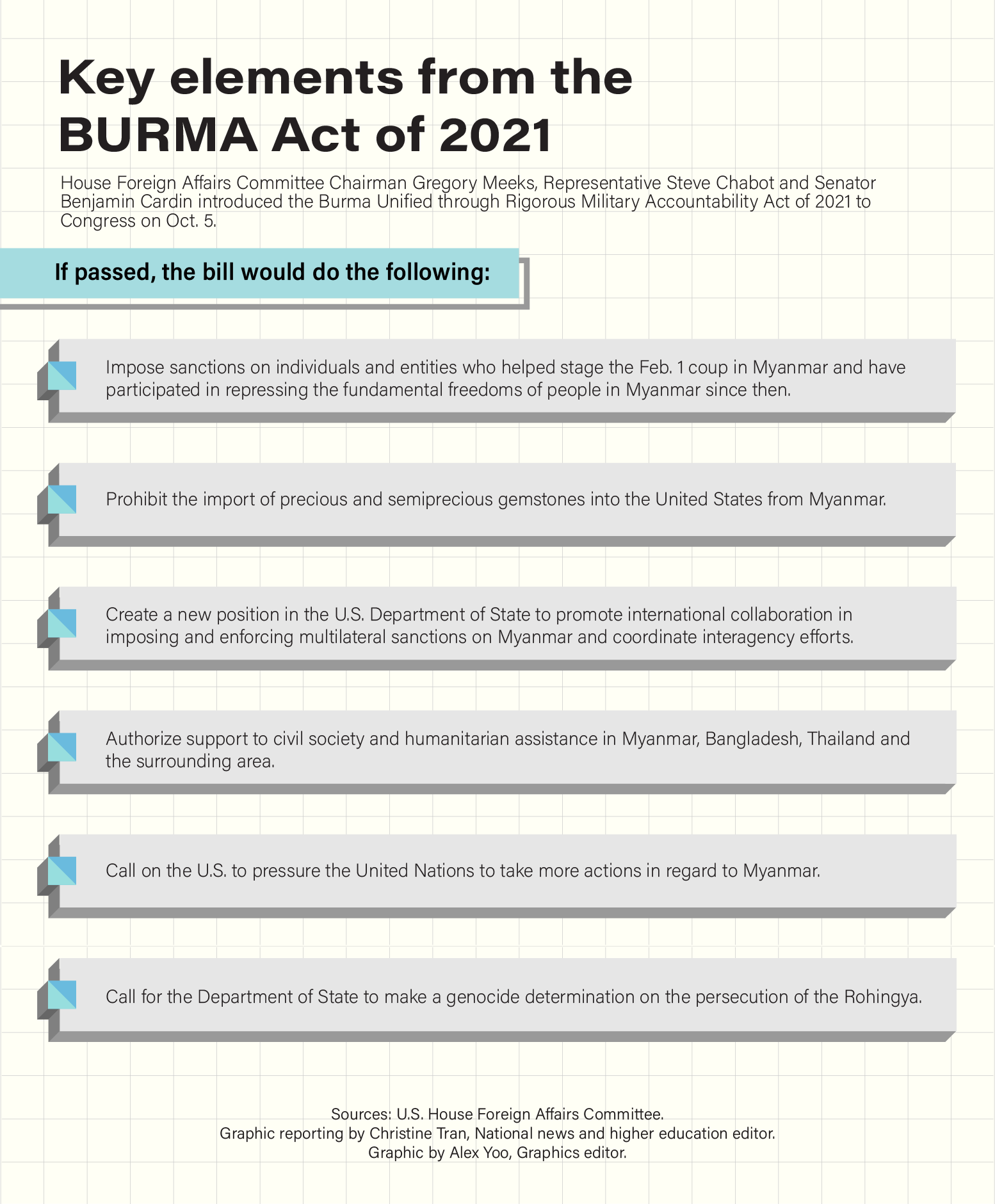Students, faculty hope new legislation can provide support for Myanmar

By Alexis Duke
Oct. 28, 2021 12:20 a.m.
UCLA students and faculty members said legislation supporting Myanmar is a start to restoring democracy in the country after experiencing civil unrest following a military coup.
On Oct. 5, the Burma Unified through Rigorous Military Accountability Act of 2021 was introduced and condemned the Burmese military for overthrowing the democratically elected government in Myanmar on Feb. 1 by imposing sanctions on Burmese economic sectors and high-ranking officials. The bill also seeks to provide further support to Myanmar through the creation of a new position responsible for coordinating international sanctions and designating funds for humanitarian aid, according to a press release from the U.S. House Foreign Affairs Committee.
Sen. Benjamin Cardin and Reps. Gregory Meeks and Steve Chabot introduced the bill to the House of Representatives, where it is awaiting a vote.
The BURMA Act’s sanctions will be crucial to punishing the Burmese military because one of the sanction’s targets is the oil and gas industry, which provides them with funding, said Mark Erste, an aide from Chabot’s office. He added that the sanctions will also freeze the assets and visa statuses of high-ranking military officials, punishing them for continuing to control the government.
However, he said these sanctions will not be fully effective against the military’s finances because Myanmar is not as integrated into the world economy, so access to international funds may not be as vital to them as it would be for other countries.
Another issue that may complicate the BURMA Act’s success is its ability to be passed into law, he added.
Chabot’s office drafted a bill in 2017 in response to the Burmese military committing genocide against the Muslim Rohingya population in Myanmar, but it failed to gain traction in Congress.
This time, Erste said he is confident the bill will pass the House but is still unsure whether the bill will pass the Senate. Regardless, he said he thinks the BURMA Act is a step in the right direction for restoring democracy in Myanmar.
“It’s just how much pressure can the (Burmese military) take, and we want to ratchet that up to as high as we can in the near term to get them to come to their senses and back off,” he said.
Seinenu Thein-Lemelson, an anthropology lecturer at UCLA, said she is also worried about the success of the BURMA Act because similar movements have occurred in the past with little change.
Thein-Lemelson said one example was the Free Burma movement of the 1990s, where there was both social and political support for actions against the Burmese military. Despite this, they had little effect against the military government because of loopholes in the sanctions, and Myanmar has continued to struggle with maintaining a stable democracy, she said.
She added that little of the humanitarian aid given to the region has reached the political prisoners she has met through her research, which makes her more skeptical of the benefits of the act.
However, Thein-Lemelson said she is hopeful about the other provisions of the BURMA Act, such as promoting more international action against the Burmese military, which will support efforts to restore democracy within the country.
“There’s only so much those who are outside of Burma can do,” she said. “What matters is the contestation that’s happening inside of the country.”
An additional step the U.S. government could take is recognizing the National Unity Government of the Republic of the Union of Myanmar – a group of former elected officials and other minority groups widely supported by the Burmese public – as the rightful government of Myanmar, said Ethan Myint, the director of advocacy of UCLA’s Burmese Student Association.
If the NUG is formally recognized, Myint said it will open up a host of new possibilities for the Burmese people, including access to billions of dollars in assets and more bargaining power on the international level, both of which can aid in the battle against the Burmese military.
Despite its shortcomings, Myint said he is glad that the U.S. is taking action to restore peace in Myanmar.
“It’s not going to solve everything, but it’s going to provide the necessary support that the Burmese community needs,” he said.
For now, the best action students and other individuals can take to support the Burmese people is to donate to humanitarian groups and raise awareness about the situation in Myanmar, Myint added.
“It’s only when people know that things are happening and they care about it (that) any kind of action can be taken,” he said.

